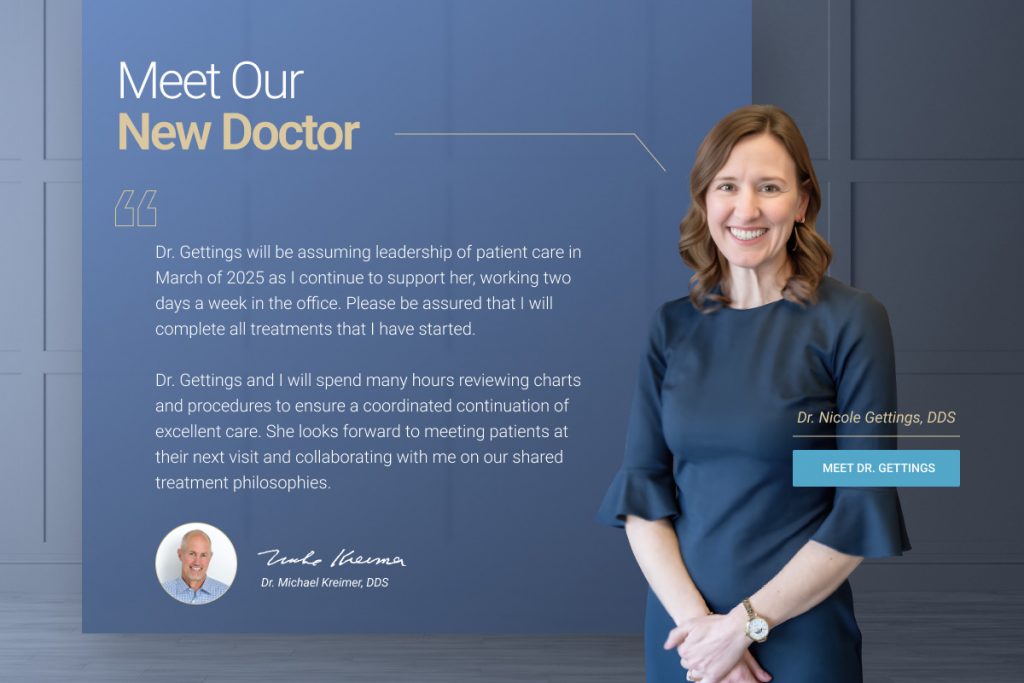Restoring Your Smile with Dental Implants
Dental implants are a revolutionary tooth replacement option that can restore your smile’s function and appearance. At Michael Kreimer, DDS, Family and Implant Dentistry in Loveland, OH, we offer state-of-the-art dental implant solutions to help you regain your confidence and improve your oral health. Our team, led by Dr. Michael Kreimer, is committed to providing personalized care and exceptional results for each patient.
Are you ready to transform your smile? Call our Loveland implant dentisttoday at (513) 677-3656to schedule your dental implant consultation with Dr. Kreimer.
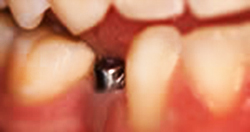
Showing implant
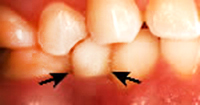
Restoration
What Are Dental Implants?
Dental implantsare a sophisticated restorative solution designed to replace missing teeth. They comprise three essential components:
- Implant Fixture: This is the foundation of the implant, often made of biocompatible titanium. Surgically placed into the jawbone, it serves as a sturdy anchor, mimicking the root of a natural tooth.
- Abutment: The abutment is a connector piece linking the implant fixture to the prosthetic tooth or crown. It protrudes above the gum line and provides support for the final restoration.
- Prosthetic Tooth: Also known as the dental crownor artificial tooth, this is the visible part of the dental implant. Custom-crafted to match the color, shape, and size of your natural teeth, the prosthetic tooth ensures a seamless blend with your smile.
Together, these three components work to provide a permanent and aesthetically pleasing solution to missing teeth. Dental implants not only restore your smile but also safeguard your oral health, offering a level of functionality and comfort akin to natural teeth. The implant process can be done in three appointments: initial consultation, implant placement, and completion of the restoration.
Benefits of Dental Implants
There are many benefits to receiving dental implants, including:
- Lifetime restoration
- Natural-looking
- Improved speech and eating ability
- Customized for you
- Preserve jawbone density
- Maintains facial shape
- Resistant to tooth decay
- Doesn’t require root canals
Types of Dental Implants We Offer
At Michael Kreimer, DDS, we provide various dental implant options to meet your specific needs:
Single Tooth Implants
Single-tooth implants are the most straightforward implant solution, ideal for patients with one missing tooth. Unlike traditional bridges that rely on neighboring teeth for support, a single-tooth implant is a self-sufficient solution. It consists of an implant post, abutment, and a custom-made crown that mimics the look and function of a natural tooth. This option preserves the health of surrounding teeth, which don’t need to be altered, and provides a long-lasting, aesthetically pleasing result.
This is a great choice when only one tooth is missing, offering a more permanent and natural-looking solution than a dental bridge, which might require shaving down adjacent teeth.
Implant-Supported Bridges
Implant-supported bridges are designed for patients missing multiple adjacent teeth. Unlike traditional bridges, which rest on neighboring teeth for support, this solution uses two or more dental implants to anchor the bridge securely. This offers superior durability, preserves bone health by stimulating the jawbone, and avoids the need to modify surrounding teeth.
Implant-supported bridges are ideal when multiple teeth are missing in a row. They are more stable and longer-lasting than traditional bridges and more secure than removable partial dentures. While not as extensive as implant-retained dentures or All-on-4® implants, they provide a localized solution for smaller gaps.
Implant-Retained Dentures
Also called overdentures, implant-retained dentures offer a secure fit for patients who are missing most or all of their teeth. Unlike traditional dentures, which can slip or require adhesives, these dentures are anchored by implants, providing greater stability. They can be removed for cleaning, but offer improved chewing ability and comfort compared to regular dentures.
This is a more affordable option than the All-on-4® implants, providing a stable fit without the permanent attachment of a full arch. It’s a good middle ground for patients seeking stability without committing to a fully fixed option like All-on-4®.
All-on-4® Implants
All-on-4® implants are a revolutionary option for patients missing an entire arch of teeth. This method uses just four implants to anchor a full arch of replacement teeth. The implants are strategically placed to maximize support, often allowing for immediate loading of the teeth on the same day as the surgery. This option provides the closest alternative to natural teeth, offering a fixed, permanent solution with excellent function and aesthetics.
All-on-4® implants offer the most comprehensive solution for full-arch restoration, providing a permanent, non-removable set of teeth that functions and feels like natural teeth. While it is a more extensive procedure than implant-retained dentures, the results are longer-lasting and typically more natural in function and appearance. It also offers a quicker turnaround than placing individual implants for each missing tooth.
Dental Implants vs. Other Tooth Replacement Options
When considering tooth replacement, it’s crucial to understand why dental implants stand out. Unlike cumbersome, high-maintenance dentures, dental implants offer a permanent and stable solution. They are designed to mimic the natural look and feel of teeth, ensuring a seamless integration into your smile.
Additionally, dental implants go beyond mere aesthetics. They play a vital role in preserving your jawbone health, preventing potential bone loss that may occur with other options like bridges. Unlike bridges, which require modifying adjacent healthy teeth for support, dental implants operate independently, ensuring the integrity of surrounding teeth.
In contrast to removable partial dentures, which may not provide the same stability, dental implants offer unmatched confidence in speech and chewing efficiency. They bypass the potential discomfort or difficulty often associated with removable options. Moreover, implant-supported dentures combine the stability of implants with the convenience of dentures, ensuring enhanced functionality and a heightened sense of well-being.
Preparation Tips
Before undergoing a dental implant procedure, it’s important to be well-prepared. Follow these steps to ensure a smooth experience:
- Consultation and Assessment: Schedule an initial consultation with Dr. Kreimer to discuss your specific case. This is the time to share your medical history, any medications you’re taking, and any concerns you may have.
- Dental Hygiene: Maintain good dental hygiene leading up to the procedure. Brush your teeth twice daily, floss regularly, and use an antimicrobial mouthwash.
- Nutrition and Hydration: Ensure you’re eating a balanced diet rich in essential nutrients. Proper nutrition supports the healing process. Stay well-hydrated to aid in recovery.
- Avoid Smoking and Excessive Alcohol: If you smoke, consider quitting or at least reduce smoking leading up to the procedure. Smoking can hinder the recovery process. Limit alcohol consumption as well.
- Arrange Transportation: Since you may receive a local anesthetic or sedation, it’s advisable to arrange for someone to drive you to and from the appointment.
- Follow Pre-Procedure Guidelines: Dr. Kreimer will provide specific instructions to follow in the days leading up to the implant placement. This may include dietary restrictions and any temporary adjustments to your oral care routine.
The Dental Implant Process
Initial Consultation
In this crucial first step of the dental implant process, Dr. Kreimer conducts a comprehensive assessment. This includes a review of your medical history, taking X-rays, and impressions. He may also perform any necessary preliminary treatments.
You can use this time to talk about your smile goals and ask any questions you may have. If Dr. Kreimer determines dental implants are right for you, he’ll then develop your personalized treatment plan.
Implant Placement
You’ll return to our Loveland dental clinic for the placement procedure. With your comfort in mind, Dr. Kreimer administers a local anesthetic and offers dental sedation. After making sure you don’t feel anything and feel relaxed and comfortable, we’ll start the dental implant surgery.
Our implant dentist will gently create space for the implant and secure the anchor in place. He’ll then place a temporary cap and reposition the gum tissue around the implant. From here, the osseointegration process commences. This is the process where the bone will fuse with your implants to create a secure bond. This process can take anywhere from three to six months.


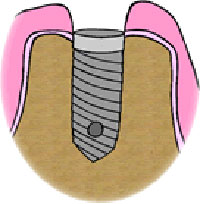
Completing the Restoration
Following successful healing, you’ll return for the final restoration phase. Dr. Kreimer will remove the temporary cap from the anchor and he’ll attach the post to the anchor. He’ll take impressions of the implant, this is to ensure the prosthetic tooth will be made for a precise fit. Afterward, the prosthetic is ready and placed into the implant and you’ll leave our office with a brand new smile.
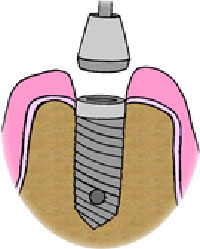
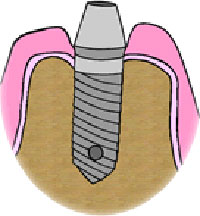
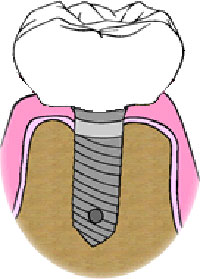
Post-Implant Care and Maintenance
After the dental implant surgery, proper care is crucial to ensure the success and longevity of your new dental implant. Follow these guidelines:
- Immediate Aftercare: Expect some swelling and minor discomfort. Apply ice packs and take any prescribed pain medications as directed by Dr. Kreimer.
- Dietary Restrictions: Stick to soft, non-chewy foods for the first few days after the procedure. Avoid hot or excessively cold foods and beverages.
- Oral Hygiene: Continue to brush your teeth gently, but avoid the implant area for the first few days. Use an antimicrobial mouthwash to help prevent infection.
- Avoid Disturbing the Implant: Be cautious while eating and avoid touching the implant area. This allows for proper healing and integration with the jawbone.
- Follow-Up Appointments: Attend all scheduled follow-up appointments with Dr. Kreimer. These appointments are crucial for monitoring the recovery process and ensuring everything is proceeding as planned.
- Long-Term Care: Maintain regular dental check-ups and cleanings. Dr. Kreimer may recommend specific oral care products or techniques to help preserve your implant.
- Alert Your Dentist to Any Issues: If you experience any unusual discomfort, swelling, or signs of infection, contact Dr. Kreimer’s office immediately.
Ideal Candidate for Dental Implants
Not everyone is a suitable candidate for dental implants. Dr. Kreimer evaluates each patient to ensure the best possible outcome. An ideal candidate for dental implants typically possesses the following characteristics:
- Good Oral Health: The candidate should have overall good oral health with healthy gum tissue and sufficient jawbone density to support the implant.
- Stable General Health: A stable medical condition is essential for successful implant placement. Candidates should be free from uncontrolled chronic diseases that may compromise healing.
- Commitment to Oral Hygiene: A dedication to maintaining excellent dental hygiene practices is crucial. This includes regular brushing, flossing, and attending routine dental check-ups.
- Non-smoker or Willing to Quit: Smoking can significantly impede the healing process and success of dental implants. Ideal candidates are non-smokers or willing to quit smoking before the procedure.
- No Active Periodontal Disease: Candidates should not have active periodontal (gum) disease. Any existing gum issues should be treated and resolved before implant placement.
- Realistic Expectations: An ideal candidate understands the limitations and benefits of dental implants and has realistic expectations about the outcome of the procedure.
- Adequate Bone Density: Sufficient jawbone density is necessary to support the implant. In cases where bone density is inadequate, bone grafting procedures may be recommended.
- Absence of Teeth or Unrestorable Teeth: Candidates may have one or more missing teeth or teeth beyond restoration. Dental implants provide a viable solution for these situations.
- Good Healing Capacity: Candidates should have a history of successful wound healing. Conditions that impair healing, such as certain autoimmune disorders or medications, should be discussed with Dr. Kreimer.
- No Clenching or Grinding Habits: Candidates with severe teeth clenching or grinding habits (bruxism) may not be suitable for implants without additional intervention or appliances.
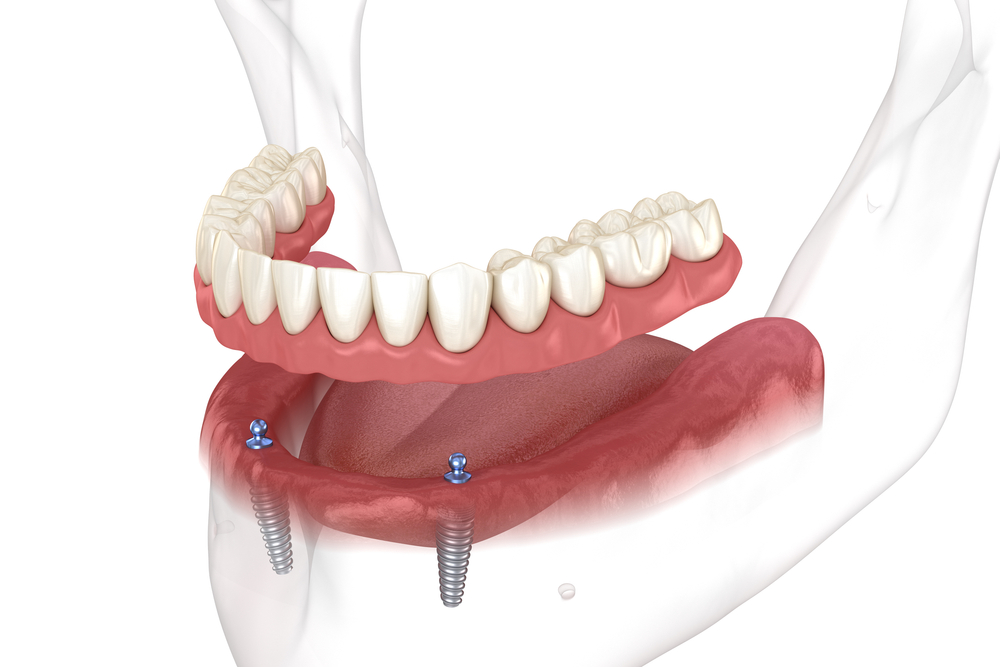
Cost and Insurance
The cost of dental implant surgery can vary widely based on several factors, including the location of the dental practice, the expertise of the oral surgeon, and the complexity of the procedure. On average, a single dental implant can cost between $1,000 and $3,000. However, the total cost may increase depending on the number of implants required and the type of artificial teeth used.
Many dental insurance plans offer partial coverage for dental implant surgery, but the extent of coverage can differ significantly between plans and providers. It’s essential to consult with your insurance provider to understand your benefits and coverage limits. Additionally, discussing financing options with your oral surgeon can help manage the costs and make the procedure more affordable.
Frequently Asked Questions
How long do dental implants last?
Dental implants can last a lifetime with proper care and maintenance. The longevity of implants depends on factors such as oral hygiene, lifestyle habits, and regular dental check-ups. While the implant itself can last decades, the prosthetic tooth may need replacement after 10 to 15 years due to normal wear and tear.
Are dental implants painful?
Most patients report minimal discomfort during and after the implant procedure. Local anesthesia is used during the surgery, and post-operative pain can typically be managed with over-the-counter pain medications. Some swelling and bruising may occur, but these symptoms usually subside within a few days.
How long does the dental implant process take?
The entire dental implant process can take several months to complete. After the initial implant placement, a healing period of three to six months is necessary for osseointegration to occur. Once the implant has fully integrated with the bone, the final prosthetic tooth can be attached. In some cases, immediate loading techniques may allow for faster completion of the process.
Can anyone get dental implants?
Most adults in good general and oral health are candidates for dental implants. However, certain factors such as smoking, uncontrolled diabetes, or severe bone loss may affect candidacy. A thorough evaluation by a qualified implant dentist is necessary to determine if dental implants are right for you.
How do I care for my dental implants?
Caring for dental implants is similar to caring for natural teeth. Regular brushing, flossing, and dental check-ups are essential for maintaining implant health. Your dentist may recommend special cleaning tools or techniques to help you effectively clean around your implants and prosthetic teeth.
Revitalize Your Smile with Dental Implants in Loveland, OH
At Michael Kreimer, DDS, Family and Implant Dentistry, we’re committed to helping you achieve optimal oral health and a beautiful smile. Our dental implant solutions offer a permanent, natural-looking option for replacing missing teeth and restoring your confidence.
If you’re considering dental implants, we invite you to schedule a consultation with Dr. Kreimer at our Loveland office. We also welcome patients from the surrounding areas of Mason, Montgomery, and Blue Ash. Take the first step towards a transformed smile by contacting usat (513) 677-3656today.


